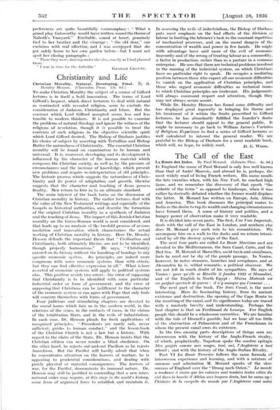The Call of the East
than that of Andre Maurois, and abroad he is, perhaps, the
most widely read of living French writers. His name recalls the late twenties when, with his New York, he reached high
fame, and we remember the discovery of that epoch "the esthetic of the town " as opposed to landscape, when it was rather hysterically debated whether the former would displace the latter. M. Morand has written on Europe, Asia, Africa and America. This book discusses the principal routes to India as the desire to tap its wealth and changing circumstances have formed them. A sense of history and politics, and a hungry power of observation make it very readable.
It is divided into seven parts. The first, Une Voie Imperiale, deals with the call of the East in London, and nowhere else
does M. Morand give such rein to his romanticism. We accompany him on a walk to the docks and we return intoxi- cated by all the drowsy syrups of the East.
The next four parts are called La -Route Maritime and are devoted to the Mediterranean, the Suez Canal, Cairo, and the Red Sea. M. Morand at Marseilles, amid taxis and-omnibuses,
feels- he need not be shy of the purple passage. In Venice, however, he notes steamers, launches and aeroplanes, and at
Alexandria he is, withal romantic, a political observer. We are not left in much doubt of his sympathies. He says of Venice : pour qu'elle se Reveille it faudra 1922 et Mussolini, and of the English in North Egypt : Marsa Matrouh est vin parfait spectacle de guerre : it n'y manque que l'ennemi . . .
The next part of the book, The Suez Canal, is the most interesting. Here its fascinating history, from its ancient
existence and destruction, the opening of the Cape Route to the recutting of the canal, and its significance today are traced with a masterly brevity and understanding. Perhaps the best chapter is that on Ferdinand de Lesseps. For English people this should be a wholesome corrective. We are familiar with the tale of Disraeli's gamble, but we hear all too little of the obstruction of Palmerston and of the Frenchman to whom the present canal owes its existence.
In the two ensuing parts descriptions of things seen are interwoven with the history of the Anglo-French rivalry,
of which, prophetically, Napoleon spoke the sombre epitaph Mes projets comme mes songes, tout; oui, rAngleterre a tout detririt ; and with the history of the Anglo-Italian Rivalry.
- Part VI La Route Terrestre follows the same formula of interwoven experience and learning, and with a mixture of sarcasm and admiration M. Morand speaks of the slow success of England over the "Drang nach Osten." Le monde a tendance a croire que les colonies sent tombees toules reties du del dans la bouche d'Albion aux longues dents, but he sums up rhistoire de la conqufte du monde par l'Angleterre vaut noire histoire coloniale an Point de vue de l'heroisnie, et la surpasse an point de vue de la tenaciti. In the last part La Route Adrienne he discusses modern Palestine, discovers a Zionist sympathy and finds little to criticise in the Administration. This comes as a surprise for otherwise he seems credulous of the unfailing perfidy of Albion.
It is an entertaining book. But it is impossible not to regret M. Morand's failing : a predilection for the dramatic, common to writers with a voluptuous sense of the past. This leads him into fallacies, if the fallacies permit a historical wallow. He speaks of the- effete Nabateans preferring to Carve and hollow out rocks to building houses, surely a strenuous preference for an enervated race. It leads' him to a stupid generalisation on the Roman decadence quand la litterature prend aux frontieres la place des soldats, la fin est prochc. It leads him into appalling vulgarity. La Nuit tonthe stir lee Pyramides. Line lune torque licit en croissant dans an ciel aussi vent que l'etenelard du prophete &c. He dramatically insists that Lake Tsana is the source of the whole Nile, while it accounts for less than a third of its volume. And, above all, it leads him when dealing with an Oriental subject to use such counterfeit coin as seduction Orientate, mystere, salanique, dentin, fatal, as the regular money. But it does make him oblivious of that heavy word desenchante.
CHRISTOPHER SYKES.







































 Previous page
Previous page